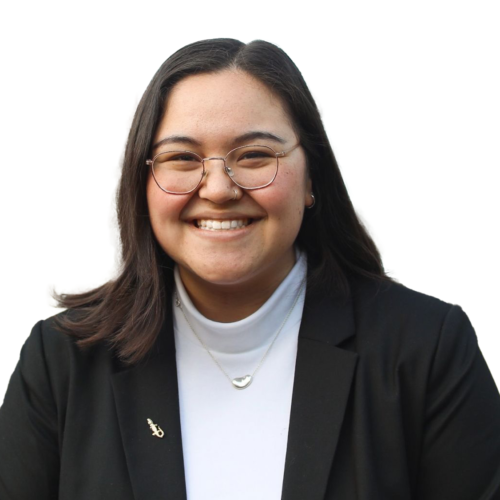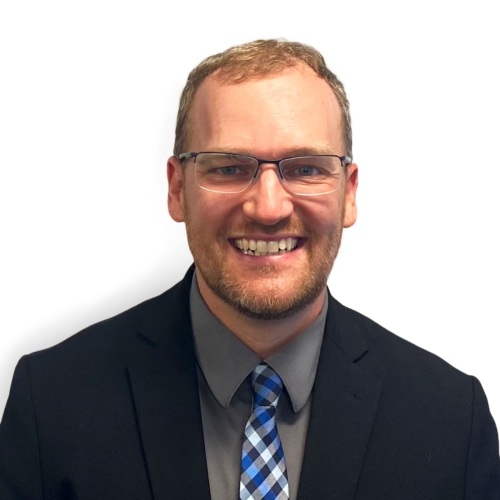Poll workers are critical to the success of our elections. According to estimates from the Election Assistance Commission, about one million poll workers are needed to staff the approximately 100,000 polling places across the country for the 2024 presidential election year. Together with professional election administrators, poll workers help keep our elections safe, secure, and accessible.
There are many opportunities for civic involvement to make positive change on pressing public issues, but voting is the primary way most people directly participate in government. Election administrators are the public servants who oversee and carry out the overall election process. They ensure compliance with laws, coordinate logistics, hire poll workers, and oversee the counting of ballots. Poll workers are trained as part of a large, temporary workforce to staff polling places during early voting and on Election Day. They are typically paid a modest stipend and perform many different tasks at their assigned polling places, including: helping voters check in, managing voter lines, troubleshooting equipment, providing directions and assistance to voters, and/or counting ballots.
“Without the help of poll workers, elections in the United States would not function,” said Issue One Director of Election Protection Carah Ong Whaley. “Being a poll worker gives people an intimate look behind the scenes of our democratic system, and research shows that the experience of being a poll worker can enhance people’s confidence that our elections are fair. There’s no better time for people to get a front row seat to how elections are administered by stepping up to serve as poll workers.”
Despite their essential role, election jurisdictions are finding it hard to recruit poll workers. According to a 2022 Election Assistance Commission report to Congress, a majority of election officials have reported difficulty recruiting enough poll workers in every major election since 2018. As intense interest in the 2024 presidential election may drive high turnout among voters, poll worker shortages could translate into long lines and disenfranchised voters, which has a corrosive effect on people’s confidence in our political system.
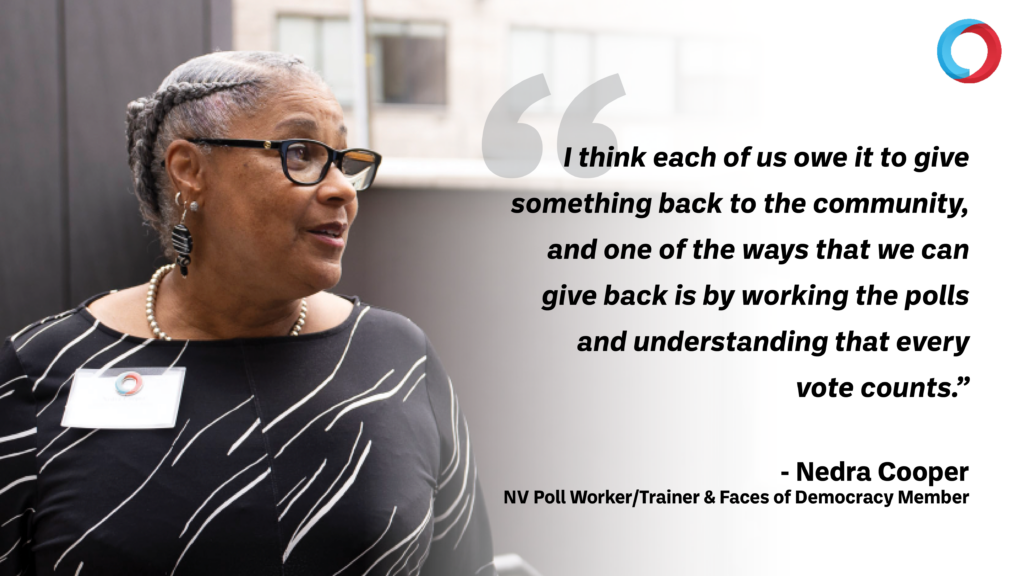
To combat this problem, election administrators are finding creative ways to expand this much needed temporary workforce. This report highlights eight creative ways that election officials and their allies are rising to the occasion and working to recruit more poll workers this year — from partnering with high schools and colleges to working with bilingual residents who can assist underserved voters to establishing programs where groups “adopt” specific polling places.
“You’re either part of the problem or part of the solution. I think each of us owe it to give something back to the community, and one of the ways that we can give back is by working the polls and understanding that every vote counts.” – Nedra Cooper, a poll worker and trainer from Nevada and member of Issue One’s Faces of Democracy campaign.
Even celebrities are stepping up to serve through organizations like Power the Polls, a nonpartisan initiative founded in 2020 that strives to recruit the next generation of poll workers to ensure safe and fair elections for all voters.
Actress, producer and director Kerry Washington has rightly said that “Poll workers are frontline heroes of democracy. Their work helps to ensure that all Americans are able to cast our votes safely and securely.”
“One great way to make a difference is to show up in your community by signing up to be a poll worker. Not only can you get paid, but you can also make sure that when people show up to vote, they see friendly faces.” – Actress and producer Annie Gonzalez.
Ways New Poll Workers Are Being Recruited
1. Raising Poll Worker Pay
While poll workers typically cite pride in performing a civic duty as their primary motivation for serving, some may be motivated by or depend on getting paid. Boosting poll worker pay, which varies widely from state to state and even across jurisdictions within states, can incentivize more citizens to work the polls and alleviate shortages in critical areas.
According to an Issue One review of information compiled by the National Conference of State Legislatures and Voting Rights Lab, at least eight states — Alabama, Alaska, Louisiana, Maryland, Mississippi, New Jersey, New Mexico, and Oklahoma — have passed legislation to bolster poll worker pay since January 2021, and many individual counties have increased spending on poll worker pay even without statewide action in attempts to improve recruitment and retention.
For instance, the Franklin County Board of Elections in Ohio voted unanimously last year to raise poll workers’ pay. San Bernardino County, California, more than doubled the stipend that some poll workers receive. And Maricopa County, Arizona, rolled out a $1,250 bonus for eligible poll workers on top of their base pay.
Meanwhile, Pennsylvania awarded its counties a total of $45 million through new state election funding grants. Nearly $9 million of this funding was spent on polling place staffing, enabling several counties to boost wages.
Paying poll workers in a timely manner can also improve motivation to serve again in the future elections.
Broward County, Florida, has replaced traditional paper checks with electronic payments, enabling the county to deliver payments two to three days after elections instead of the usual two to three weeks. Similarly, Philadelphia County, Pennsylvania, reduced their payment turnaround from eight weeks to less than two weeks.
2. Partnering with Higher Ed
Earlier this year, the Department of Education issued guidance to clarify that Federal Work Study funds could be used to hire college students to work in election offices. As part of their public service missions, more colleges and universities are building relationships between their schools and local election offices to create new pipelines of behind-the-scenes support for election administration. Programs to recruit college students contribute to the public good by helping fill critical gaps in poll workers while also increasing civic learning and trust in elections among the newest generations of voters.
According to the Election Assistance Commission (EAC), just 4% of poll workers in 2022 were between the ages of 18 and 25, about the same portion as during the 2018 elections. As part of the Help America Vote College Program, the EAC distributed a total of $1 million to 14 colleges and universities for poll worker recruitment in 2024 — the first instance of federal grants for such activities in more than a decade.
One of the programs in Texas, the Tejano Pollworker Fellows program, aims to register at least 50 El Paso Community College students as poll workers each semester, providing civic education and in-depth poll worker training. This program will bolster students’ $15 per hour poll worker pay with an additional $200 stipend. Other schools’ recruitment programs tout perks like leadership skills and networking opportunities.
In Weber County, Utah, Weber State University students have been hired to create a recruitment and training program in collaboration with the Weber County Elections Office to help accommodate Spanish speakers in the community. “These students work with the Elections Office directly to learn how to be poll workers, recruit other students and volunteers to serve as poll workers, and then train them,” said Leah Murray, the Brady Presidential Distinguished Professor and Director of the Walker Institute of Politics and Public Service at Weber State University. “This provides our students with an important opportunity to learn and practice civic skills and contribute to the broader public good.”
Meanwhile, the Arizona Secretary of State’s office launched a new fellowship program earlier this year that it advertises as akin to AmeriCorps for election workers. College students or recent college graduates receive a $15,000 stipend for five months of work supporting local election offices in counties across Arizona through November. Students provide extra hands wherever needed, gaining exposure to the myriad behind-the-scenes processes involved in elections, such as how a ballot is created, ballot proofing, voting machine logic and accuracy testing, signature verification, and more. Over a dozen fellows are part of Arizona’s pilot program this year. At the end of the program, fellows will go through a graduation ceremony and receive a certificate.
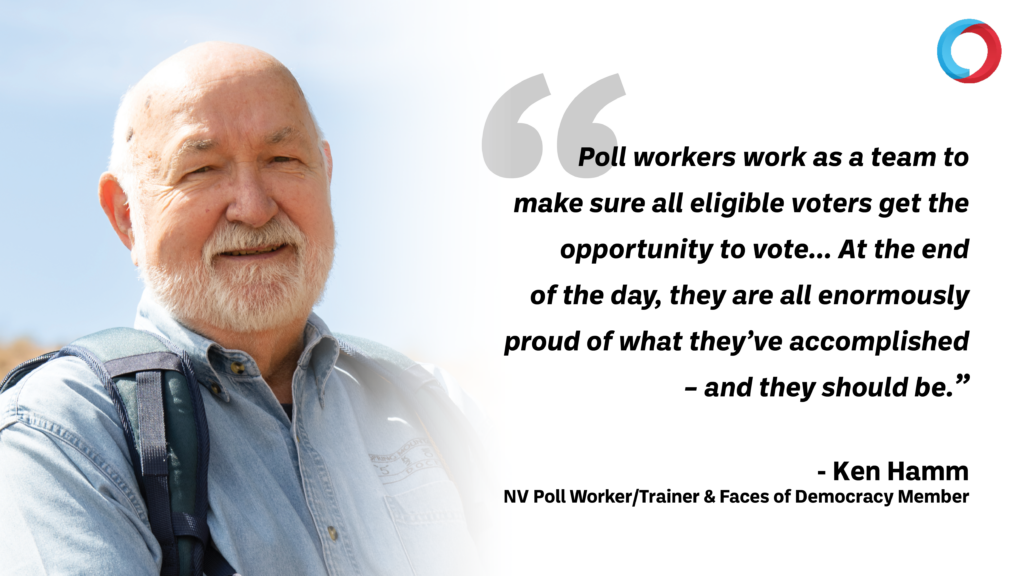
3. Partnering with High Schools
Working at the polls is not just for those of voting age. Nearly every state has provisions to allow high school students to serve as poll workers, though some states restrict full poll worker responsibilities to those over the age of 18.
Serving as a poll worker is a great way for high school students to give back to their communities, gain valuable personal and civic skills, and build their resumes for college applications. What’s more, students may receive monetary compensation or community service hours.
Among the many examples of communities already engaging young people, San Mateo County, California, partners with 20 high schools through its Student Democracy Program, which the EAC recognized with a Clearinghouse Award practices award. Each election, 125 to 150 students from these schools assist at voting centers, earning community service credits and a stipend of $280.
Similarly, Indiana’s Hoosier Hall Pass program allows students aged 16 and up to serve as poll workers and Ohio’s Youth at the Booth initiative allows students aged 17 and up to serve as poll workers, with modest financial incentives.
And in St. Louis, Missouri, there is a program for high school students as young as 15 years old to serve as greeters at polling places on Election Day, with older students taking on more advanced roles. Students who are at least 16 years old can earn community service hours or monetary compensation, while 15-year-old greeters gain academic credit in social studies.
In Pennsylvania, in addition to earning a stipend, high schoolers may be recognized with the Governor’s Civic Engagement Award.
And in Maine, a nonprofit called Youthwork Makes the Boothwork , which was launched amid the coronavirus pandemic in 2020, recruits high school students to serve at the polls as means for boosting their responsibility to the civic life of their communities.
“Here’s a wonderful chance for everybody to see how competent and engaged teenagers can be in helping us to solve some of our most pressing problems,” said co-founder Emanuel Pariser, who has worked as an educator in Maine since 1972.
4. Recruiting Veterans
Across the country, election offices and advocacy organizations like Vet the Vote are recruiting poll workers from a demographic that has already demonstrated their commitment to serving our country: veterans.
In 2022, Vet the Vote recruited more than 63,500 veterans to serve as poll workers across all 50 states. This year, the group has already recruited more than 130,000. Vet the Vote has also partnered with states including Arizona, Nevada, South Carolina, Texas, and West Virginia to host events featuring veterans and local election officials to educate residents and answer questions voters may have about the election process in their jurisdiction.
“Veterans are uniquely positioned to serve their communities again as poll workers. They vote, volunteer, and engage in community service at higher rates than non-veterans. We know from the more than 135,000 veterans and military family members who have signed up to serve as poll workers that there is tremendous enthusiasm among our community to support their local elections teams,” said Dan Vallone, Director of Vet the Vote. “As one of the most trusted communities in the nation, veterans can help anchor the election experience in a deeply patriotic narrative that reminds us there is so much more that binds us together as Americans than divides us.”
Operation Elective Service, in West Virginia, is a successful initiative established by the secretary of state’s office. This program — which taps into the patriotic spirit of veterans — echoes the iconic World War II Selective Service campaigns, such as the “Uncle Sam” poster, to recruit veterans to serve at the polls.
Similarly, in Alabama, the “Heroes at the Polls” initiative, has made strides in recruiting veterans as poll workers. And in South Carolina, the Charleston County Board of Elections runs “Operation: Civic Duty”, while the “Second Call to Duty” program established by the Ohio Secretary of State’s office encourages veterans to become poll workers.
By reminding veterans of their past service, these and other similar programs inspire veterans to protect and defend the democratic process, extending their service from the battlefield to the ballot box.
Such efforts underscore the enduring legacy of veterans’ service to their country and are a testament to the value of veterans’ ongoing contributions to society.
5. Partnering with Religious Organizations
Leaders of religious organizations know that faith communities can play a critical role in defending our free and fair elections. They also know that our democracy is buttressed when their congregants work as poll workers.
A More Perfect Union: The Jewish Partnership for Democracy is distributing $110,000 this year to Jewish partner organizations working to ensure free, fair, safe, and accessible elections. A More Perfect Union’s Ignition Grants fund efforts to recruit poll workers, counter election misinformation, support nonpartisan election officials, and promote social cohesion.
“We are so proud to once again offer grants to help our partners protect and strengthen democracy, ” said Aaron Dorfman, A More Perfect Union Executive Director. “The American Jewish community knows that a vibrant democracy is essential for Jews, other minorities, and all Americans to enjoy the rights guaranteed by our Constitution. A robust democracy relies in large part on healthy elections, and we are grateful to support so many Jewish organizations working to ensure our elections remain free, fair, safe, and accessible.”
And Interfaith America, an organization that fosters connections across faith groups, has collaborated with the nonprofit Protect Democracy to develop the Faith in Elections Playbook to equip faith communities with resources and information to preach about the need for poll workers in their local city or town.
6. Adopt a Polling Place
In several states across the country, including California, Florida, and South Carolina, a range of organizations are opting for “Adopt a Polling Location” initiatives that allow groups to send their employees or members to work at the polls for a day and collectively donate their compensation to a local charity of their choice.
Civic organizations such as Kiwanis clubs, Soroptimist groups, and Scouting troops, as well as high school sports teams and fraternities and sororities at local colleges and universities have gotten in on the adoption of polling places. Several church groups have also adopted polling places.
In Charleston, South Carolina, one of the organizations that has adopted a polling place is the local minor league hockey team, the Stingrays. In a recent election, the team mascot showed up with some players and high-fived voters at their adopted polling place.
“The essence is you find civically minded people who want to give back. They are not necessarily in it for the poll worker pay of $200. They want to actually give back to the community. One example of this is when we partnered with a local wrestling program that used this as a fundraiser for their team to buy jerseys and to fund their tournament travels. They told me that they look forward to every election because it helps them make their mark for fundraising instead of having to sell 5,000 brownies.” — Isaac Cramer, the executive director of the Charleston County Board of Voter Registration and Elections and member of Issue One’s Faces of Democracy campaign.
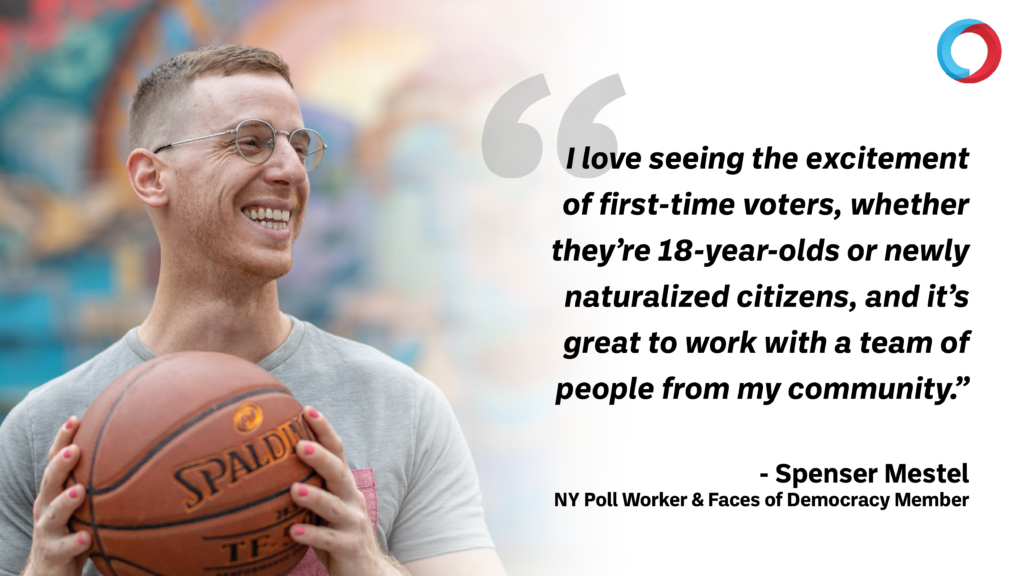
7. Partnering with Businesses
It’s not just public service sectors helping address the pressing need for poll workers.
The Civic Alliance, a nonpartisan coalition of businesses, has created the Election Day of Service, which urges businesses to demonstrate their dedication to fair, safe, and transparent elections by mobilizing employees and customers to serve as poll workers.
In recent years, major corporations including American Eagle, Levi Strauss & Co., Lululemon, Lyft, Microsoft, Patagonia, PayPal, Target, Travelers Insurance, and Uber have all participated in the Election Day of Service, offering resources and personnel to support election operations.
Some secretaries of states also encourage businesses in their states to allow employees time off to work the polls during elections.
Lawyers and other professionals are also stepping up to help mitigate poll worker shortages. For example, the Board of Realtors in West Virginia offers a program where realtors who serve as poll workers can earn continuing education credits, combining civic duty with professional development. And several states — ranging from Florida to Nebraska — have implemented policies that allow lawyers to earn continuing legal education credits by working as poll workers.
8. Recruiting Bilingual Poll Workers
Bilingual poll workers are essential for helping citizens who don’t fluently speak English understand the voting process, including operating voting machines, finding their precincts, and understanding the ballot. As the Justice Department notes, “Failure to employ bilingual poll officials at all precincts where they are needed can deprive citizens of their right to vote.”
At least one academic study has found that greater diversity among poll workers can improve voter confidence. Poll workers who reflect the communities of voters in their area — and speak more than one language — can help voters with English as a second language feel more comfortable by offering vital oral translation services at polling places and answering questions in languages other than English.
Toward this end, many election jurisdictions across the United States are running targeted recruitment campaigns to bring in bilingual poll workers and offer bilingual poll workers additional compensation.
For instance, in Los Angeles County, California, language assistance in 18 languages in addition to English is provided, ranging from Armenian to Farsi to Spanish to Vietnamese. The county encourages community members who speak these languages to become poll workers and offers a special $100 stipend to bilingual poll workers.
And in Cook County, Illinois, home of Chicago, election officials produce podcast episodes in English and Hindi that strive to recruit bilingual poll workers and explain election processes.
Beyond local government efforts, various advocacy organizations work to recruit bilingual poll workers. Mi Familia Vota, for instance, has launched initiatives to recruit Spanish-speaking poll workers, particularly targeting younger individuals through digital campaigns and partnerships with social media outlets and television networks including Univision.
Conclusion
As this report highlights, there are many innovative ways a variety of groups in various sectors are responding to the need for poll workers to help ensure elections run smoothly this year.
If you’re interested in being a poll worker, get in touch with the office of your local election official as soon as possible.
Most election administrators accept poll worker applications on a rolling basis, and submitting an application to be a poll worker as early as possible helps local election officials in their planning for upcoming elections.
If you don’t know who your local election official is, Power the Polls can help connect you.


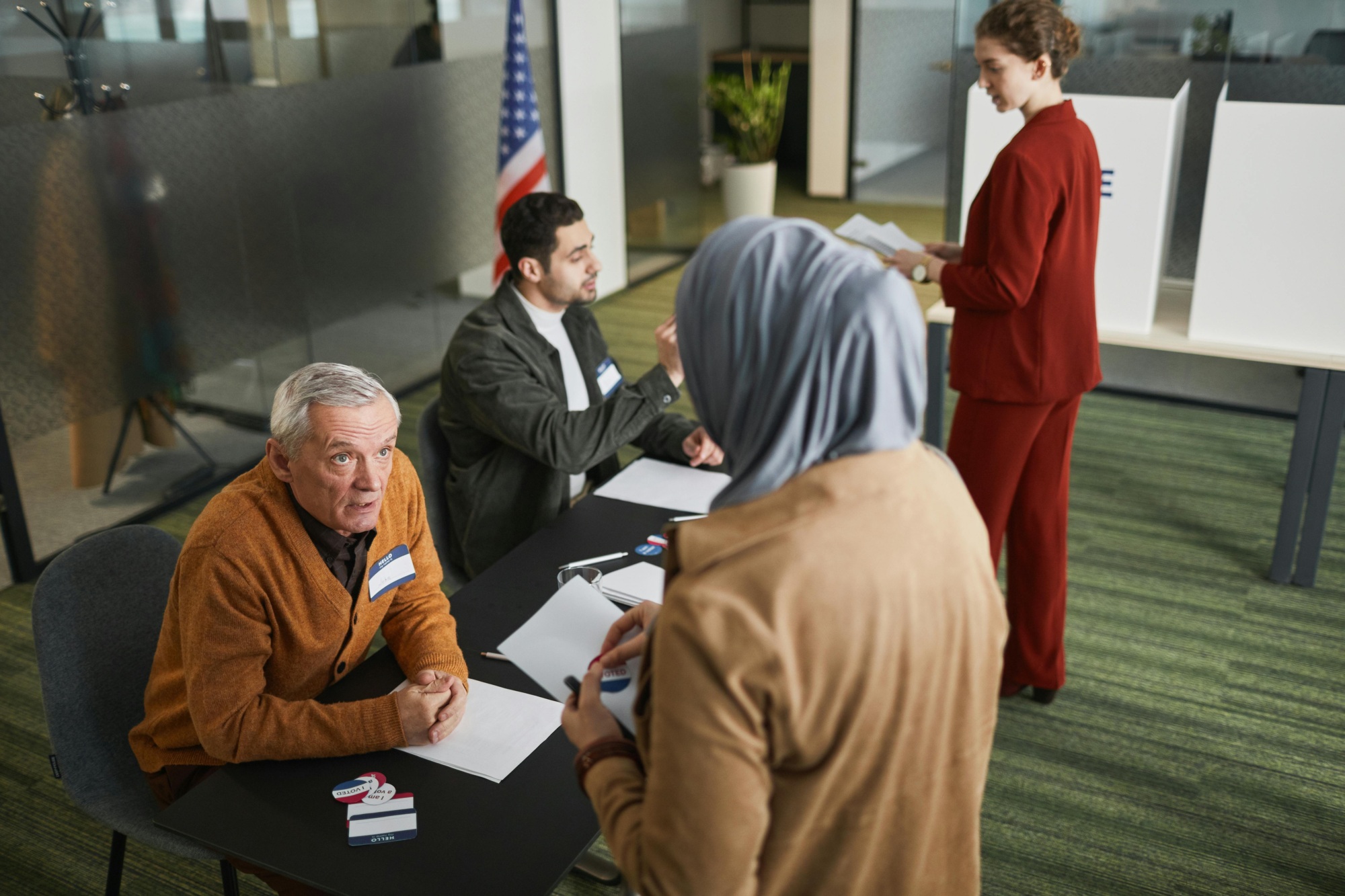 Edmond Dantès / Pexels
Edmond Dantès / Pexels
